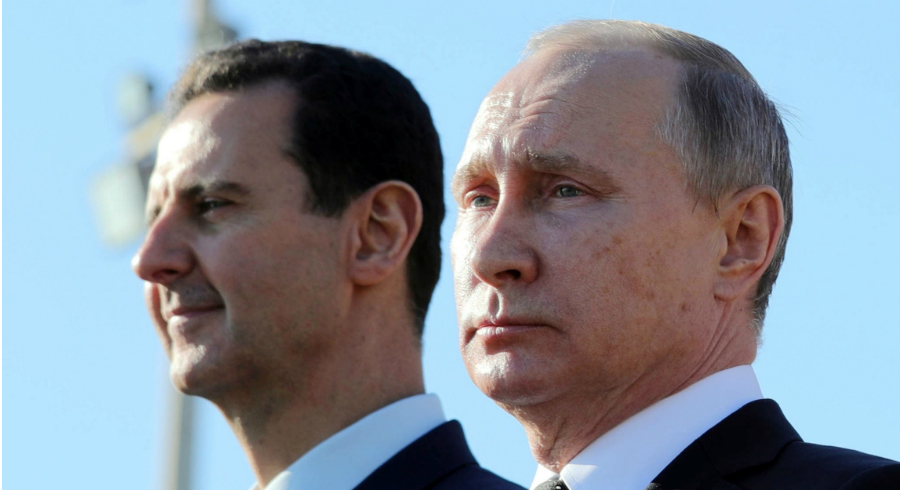Russia Might Regret the U.S. Drawdown in Syria
Editor’s Note: The Syrian conflict, while hardly over, is diminishing. The Syrian people clearly lost, but who—other than the barbarous Assad regime—won? One candidate is Russia, whose military intervention helped save the regime and which has re-emerged as a power broker in the Middle East. Carol Saivetz of MIT, however, argues this may be a mixed blessing for Moscow. Although the regime has accomplished many things in Syria, these accomplishments have created new problems that will be tricky for Moscow to solve.
Daniel Byman

Published by The Lawfare Institute
in Cooperation With

Editor’s Note: The Syrian conflict, while hardly over, is diminishing. The Syrian people clearly lost, but who—other than the barbarous Assad regime—won? One candidate is Russia, whose military intervention helped save the regime and which has re-emerged as a power broker in the Middle East. Carol Saivetz of MIT, however, argues this may be a mixed blessing for Moscow. Although the regime has accomplished many things in Syria, these accomplishments have created new problems that will be tricky for Moscow to solve.
Daniel Byman
***
When the Syrian civil war began, Russia and the United States backed opposing sides. Moscow was determined not to let another client—this time Bashar al-Assad—fall to U.S. and European intervention, and, simultaneously, the U.S. declared early on that “Assad must go.” When it became clear in summer 2015 that Assad’s regime would collapse without additional outside military support, Russia intervened. More recently, Russia has even tried to portray itself as a peacemaker, initiating negotiations, along with Turkey and Iran, to bring the bloody civil war to a close.
Moscow’s military effort—in conjunction with support from Iran and Hezbollah—was a great success. Assad now controls most of the country, and the United States, which even at its peak had a limited military presence in Syria, has announced a major drawdown of troops. On Dec. 19, 2018, President Trump tweeted, “We have defeated ISIS in Syria, my only reason for being there in the Trump presidency.” Russia’s President Vladimir Putin praised the announcement, saying, “[I]f the decision to withdraw was made, then it is the correct one.”
Since then, Russia has had to grapple more seriously with the tensions among its own partners. The maneuvering of the past few months—Trump’s announcement and subsequent Russian negotiation efforts—has left open the question of whether or not Russia can declare the Syrian civil war a “win.” At the very least, Trump’s decision has clear implications for Russia’s calculations.
Russia’s Successes in Syria
Arguably, Russia’s military intervention has succeeded beyond Putin’s wildest dreams. In addition to securing Assad’s rule, the now four-year-old campaign has allowed Russia to demonstrate its new power-projection capabilities and its steadfast support for its allies. Russia can also claim that it routed what it calls terrorist forces. Russian commentaries stress that the Kremlin’s actions in Syria enlarged Moscow’s role on the global stage. Moreover, by convening the so-called Astana Process—composed of Russia, Turkey and Iran—the Kremlin has burnished its credentials as a regional power broker.
For all these reasons, many observers argue that the U.S. drawdown in Syria is a major win for Moscow. Within hours of Trump’s announcement, Russian foreign ministry spokesperson Maria Zakharova suggested that the Syrian-Jordanian border “can now return to peaceful life, as did Aleppo. There was no such hope as long as American troops were there.” Zakharova argued that the U.S. presence was a major obstacle to a peaceful resolution of the long-fought Syrian civil war. Many Western analysts also argue that the U.S. withdrawal favors both Russia and Iran.
Russia’s Friends Like These
Though the announced drawdown of troops may appear to benefit Russia’s foreign policy objectives, there are also pitfalls for Moscow. The Kremlin has long had trouble managing its erstwhile allies in Syria. Turkey and Russia have disagreed over the fate of Kurdish forces, and, in many respects, Iran and Russia have contained their differences in the name of the fight to protect Assad. As long as U.S. forces were involved, these differences were largely secondary. Now Russia is the sole global power still in the game, and it will have to confront several crucial issues: Who will control the territory scheduled to be vacated by the United States? Will Ankara invade? Will the Kurds accept Syrian government control over their autonomy? Can the Kremlin reconcile Tehran’s long-term presence in Syria with Israeli demands for a complete Iranian withdrawal?
Despite being co-conveners of the Astana Process, Turkey and Russia disagree over the future of Idlib province and the fate of Kurdish forces along the border. At issue in Idlib, the last remaining rebel stronghold in Syria, is the presence of approximately 10,000 fighters from Hayat Tahrir al-Sham, often seen as the Syrian offshoot of al-Qaeda. In September 2018, Putin and Turkish President Recep Tayyip Erdogan approved a demilitarized zone, coupled with a Turkish promise to rid the region of jihadis. During the February 2019 Sochi meeting of the Astana trio, Erdogan took credit for “keep[ing] calamity from Idlib,” but the Russian president pushed back, saying that “we do [not] have to accept the presence of terrorist groups in Idlib.” The next month, Turkey initiated patrols of the cease-fire zone. The situation around Idlib remains unstable, which has raised the specter of an all-out assault by the Syrian government—presumably backed by Russian air cover.
Erdogan and Putin also differ on the future of Kurdish forces operating further east, in the area to be vacated by U.S. troops. Ankara is pushing for a 20-mile-deep safe zone along the border, in which no Kurdish presence would be permitted. In contrast, not only has the Kremlin not offered support for a Turkish incursion to clear the area, but instead it recommended that the Syrian regime open diplomatic channels with the Kurds. Zakharova summed up the Russian perspective in December 2018: “[W]ho will inherit control of the territories vacated by the Americans?” she asked. “Obviously, that should be the Syrian government.”
Putin’s chosen mechanism for resolving Ankara’s and Damascus’s separate visions for postwar Syria is the Adana accord. The agreement, which was signed by Syria and Turkey in 1998 but eventually disregarded, guaranteed security along the Turkish-Syrian border and, most importantly, declared the Kurdistan Workers’ Party a terrorist organization. Damascus has offered qualified agreement, but it is unlikely that Erdogan would agree. The Turkish president fears that even if the Kurdish Peoples’ Protection Group is incorporated into the Syrian army, it would remain semiautonomous. Additionally, this solution would require the restoration of communication between Erdogan and Assad. Despite some intelligence cooperation, Turkey remains—at least for now—committed to pushing Assad from power. In January, Turkish foreign minister Mevlut Cavusoglu stated that Moscow and Ankara continue to disagree over “whether President Bashar al Assad should stay in office.”
And Moscow’s relations with the other Astana co-convener, Iran, are replete with suspicions. Initially, there seemed to be a division of labor between the two: Russia provided air support, while Iran and Hezbollah assisted Syrian government forces on the ground. Now, as the war seems to be winding down, Russia appears intent on facilitating a peace with buy-in from many stakeholders, while Iran is committed to solidifying its gains in Syria. It’s not clear how the other players, most notably Turkey and even the Syrian government, would react to the permanent Iranian presence Tehran would like to secure.
Iran’s efforts to further entrench itself in Syria will be exceedingly difficult for Russia to handle. Over the years, Moscow has developed good relations with Tel Aviv, based in large measure on trade and the fact that more than 20 percent of the Israeli population is Russian speaking. During the Syrian civil war, Russia has for all practical purposes given Israel a green light to attack Iranian and Hezbollah targets in Syria and to prevent the transshipment of Iranian equipment and munitions to Hezbollah in Lebanon. Additionally, Russia negotiated to keep Iranian forces 85 kilometers away from the Israeli border. Yet, in September 2018, when Syrian forces accidentally shot down a Russian jet during an Israeli attack, Moscow blamed Israel for instigating the attack. Israel expressed regret for the accident—even though it was not directly responsible—but it took almost six months for relations to improve.
Israeli Prime Minister Benjamin Netanyahu traveled to Moscow in late February 2019 to meet with Putin. (The meeting had been postponed for a week due to Israeli electoral concerns.) According to multiple press reports, Netanyahu told Putin that Iran is the greatest threat to regional security and that Israeli forces would continue to attack Iranian and Hezbollah forces in Syria.
Iran is also being proactive. Just days before Netanyahu traveled to Moscow, Syrian President Assad flew to Tehran, where he was warmly welcomed by Iranian leaders. Many analysts speculated that by courting Assad, Iran not only showed its displeasure with the Russian-Israeli relationship but also made clear that it intends to stay in Syria.
Moscow’s conflicting interests in finding a resolution to the civil war that can satisfy both countries places it right in the center of the Israeli-Iranian rivalry. Can it offer security guarantees to Israel at the same time that it continues to cooperate with Iran? Moscow is equivocating. Russia has criticized Israeli attacks on targets in Syria; in January, Zakharova said that “[t]he practice of arbitrary strikes on the territory of a sovereign state … [that is, Syria] should be ruled out.” But Russia has also distanced itself from its Iranian partners. Deputy Foreign Minister Sergei Rybov, in response to a question from CNN about whether Russia and Iran were allies, stated that he “wouldn’t use this type of word to describe where we are with Iran.”
This balancing act can lead to miscommunication. Netanyahu told a weekly cabinet meeting on March 3 that he and Putin had agreed on “the withdrawal of foreign forces that arrived in Syria after the outbreak of the civil war.” Did Russia mean the United States? Did Israel mean Iran? Neither side offered a clarification.
Wary of ‘Dreadful Scenarios’
The push and pull of Russia’s ties to its Astana Process partners predates the announced U.S. drawdown. In isolation, each of these bilateral relations brings benefits to the Kremlin—from help in consolidating the Assad regime, to loosening the bonds between Turkey and NATO, to Israeli technological help. But in the absence of U.S. forces, Moscow will face greater challenges to successfully allay the conflicts between and among them in order to achieve its ultimate goal—to be the go-to state in the region.
In a February 2019 article, Andrey Kortunov, the head of the Russian International Affairs Council, and Michel Duclos catalog what they call “dreadful” scenarios for Syria. The list includes resumption of fighting between Turkey and the Kurds and military conflict erupting between Iran and Israel. Russian officials are aware of how their partners’ interests could initiate new conflicts, and they are clearly concerned.
Last December, shortly after Trump announced plans to withdraw U.S. troops from Syria, Putin expressed skepticism that the United States would indeed complete its withdrawal. His skepticism may have indeed been warranted. On March 5, Trump confirmed that the U.S. would leave 400 troops in Syria, and subsequent reporting has indicated that the number may be closer to 1,000 troops in the near term. Putin may be relieved. A full drawdown would leave the Kremlin alone to cope with these dreadful scenarios and responsible for what occurs down the road.





